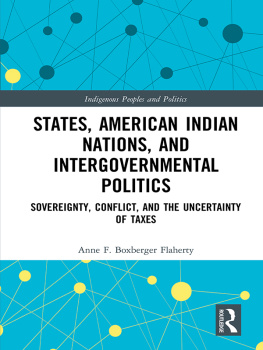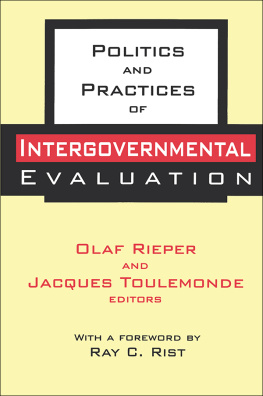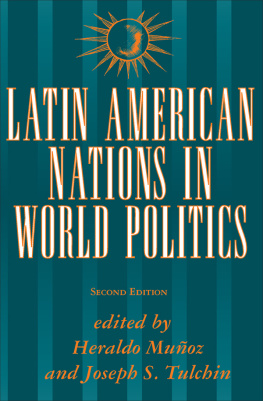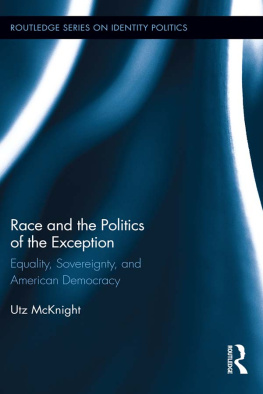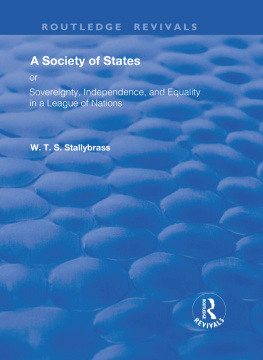Flaherty has a gift for seeing both tribal and state perspectives. She uses this to provide a broad political analysis for the resolution of tribal versus state and federal taxation controversies. Her broad coverage of recent historical detail and case law, most of which seems not previously to have been integrated into book format, will make this an important primer and reference for people working in policy and legal analysis for tribe-state or federal-to-tribe issues.
Fritz Laux, Northeastern State University
States, American Indian Nations, and Intergovernmental Politics is an important addition to our understanding of the complex relationship between Native Nations and American States. Its use of taxation as an example of the broader conflict between tribal sovereignty and states efforts to exert authority over Indian businesses highlights the struggles faced in a changing political and legal environment. Flahertys use of historical, quantitative and case study analysis is especially helpful in providing a fuller picture of contemporary intergovernmental relations.
Richard C. Witmer, Creighton University
States, American Indian Nations, and Intergovernmental Politics
American Indian nations are sovereign political entities within the United States. They have complex relationships with the federal government and increasingly with state governments. Regulatory conflict between Native nations and states has increased as Native nations have developed their own independent economies and some states have sought to assert their control over reservation territory. This book explores the intergovernmental conflict between Native nations and states, with a focus on the tension over the enforcement of state cigarette taxes for on-reservation sales. Anne F. Boxberger Flaherty asks, When do states and Native nations come to agreement, when do they disagree, and why are states sometimes willing to extend great efforts to assert their taxes on reservations?
Flaherty uses a multimethod approach, with a historical review of expanding state involvement on reservations, a quantitative analysis of state enforcement of cigarette taxes on reservations, and a qualitative analysis of several specific case studies, including the potential for intergovernmental conflict over marijuana cultivation and sales on reservations to answer these questions.
This book will be of interest to scholars and researchers of Indigenous Politics,Native American Indian Politics, State Politics, and Intergovernmental Politics.
Anne F. Boxberger Flaherty is Assistant Professor of Political Science at Merrimack College.
Indigenous Peoples and the Law
Franke Wilmer, General Editor
The State and Indigenous Movements
Keri E. Iyall Smith
Speaking with Authority
The Emergence of the Vocabulary of First Nations Self Government
Michael W. Posluns
Media and Ethnic Identity
Hopi Views on Media, Identity, and Communication
Ritva Levo-Henriksson
The State, Removal and Indigenous Peoples in the United States and Mexico, 1620-2000
Claudia B. Haake
Indigeneity in the Courtroom
Law, Culture, and the Production of Difference in North American Courts
Jennifer A. Hamilton
Politics and Aesthetics in Contemporary Native American Literature
Across Every Border
Matthew Herman
Indigenous Knowledge, Ecology, and Evolutionary Biology
Raymond Pierotti
Indigenous Nations and Modern States
Rudolph C. Ryser
Negotiations in the Indigenous World
Ciaran OFaircheallaigh
States, American Indian Nations, and Intergovernmental Politics
Sovereignty, Conflict, and the Uncertainty of Taxes
Anne F. Boxberger Flaherty
States, American Indian Nations, and Intergovernmental Politics
Sovereignty, Conflict, and the Uncertainty of Taxes
Anne F. Boxberger Flaherty
First published 2018
by Routledge
711 Third Avenue, New York, NY 10017
and by Routledge
2 Park Square, Milton Park, Abingdon, Oxon OX14 4RN
Routledge is an imprint of the Taylor & Francis Group, an informa business
2018 Taylor & Francis
The right of Anne F. Boxberger Flaherty to be identified as author of this work has been asserted by her in accordance with sections 77 and 78 of the Copyright, Designs and Patents Act 1988.
All rights reserved. No part of this book may be reprinted or reproduced or utilised in any form or by any electronic, mechanical, or other means, now known or hereafter invented, including photocopying and recording, or in any information storage or retrieval system, without permission in writing from the publishers.
Trademark notice: Product or corporate names may be trademarks or registered trademarks, and are used only for identification and explanation without intent to infringe.
Library of Congress Cataloging in Publication Data
A catalog record for this book has been requested
ISBN: 978-1-138-66627-6 (hbk)
ISBN: 978-1-315-61947-7 (ebk)
Dedicated to my children, Mariel, Noella, and Holden, and my husband, Patrick.
I have always found intergovernmental relations and tensions fascinating. As an undergraduate student, I was intrigued by the interplay between the state and federal government. Tensions between the state and federal interests over interpretations of jurisdiction have been ever-present in our federal system. As a graduate student, however, I began to question why the discussions on intergovernmental relations seemed to never mention a very obvious governmental presence. Where were Native nations in the framework? I grew up in upstate New York, where Native nations have been a very political and visible presence throughout my lifetimejust as they have throughout the countryyet much of the scholarship in political science seemed to ignore their existence.
The reality is that Native nations are vibrant, politically active entities that have a very important place in our governing system. Thanks to the contributions of a broad range of scholars, the literature on Native politics and their place in intergovernmental politics has grown dramatically since I began my graduate work, which is wonderful to see and has enriched our understandings of the political world in many ways. Practical and academic wisdom on Native nations is incredibly important for political decision makers at all levels and our broader understanding of American politics. This book presents one particular perspective, and my goal is to further build understandings of tribalstate relations and to contribute to the possibilities of a collaborative future. I also hope that this work can serve as an additional step toward bringing Native politics out of a niche field and into the general study of American politics, where it belongs.
The process of developing this book has spanned many years and evolved through several iterations. In the midst of my research, my family and I moved halfway across the country, from St. Louis, Missouri, to Exeter, New Hampshire, and I took a new job. While the move and transition certainly delayed my progress, I was very fortunate in getting support from both institutions and from a wonderful assortment of colleagues.

